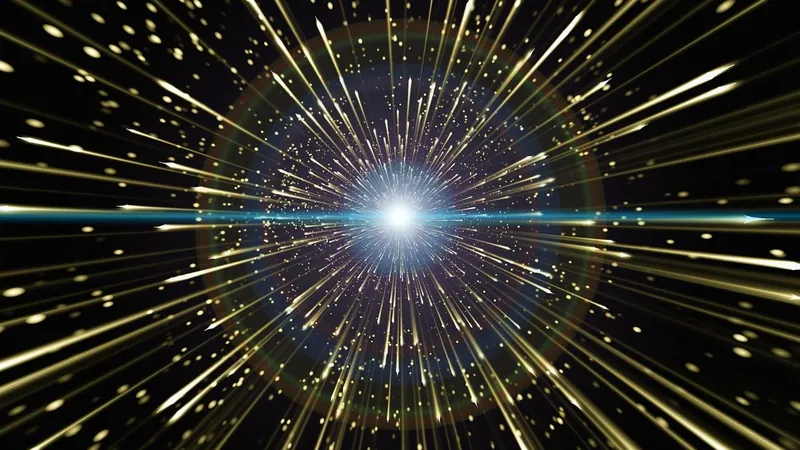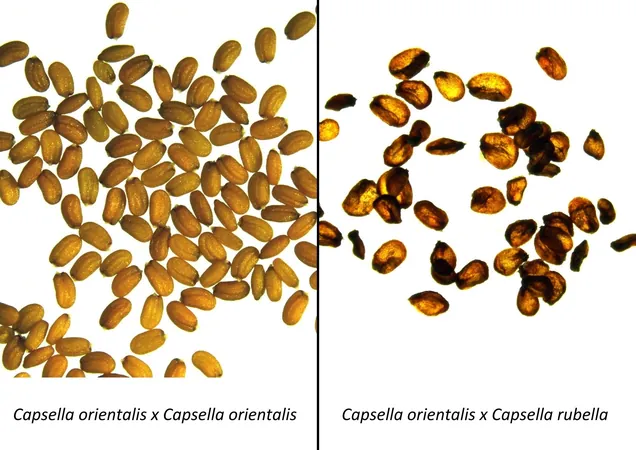
The Spectacular Truth Behind 'Hawking Radiation' — Are Black Holes on the Brink of Explosion?
2024-11-06
Author: Emma
In a groundbreaking new study, scientists are unveiling the possibility that primordial black holes (PBHs) could be heating up and detonating across the universe, thanks to an enigmatic process known as Hawking radiation.
This phenomenon, proposed by the legendary physicist Stephen Hawking, might offer insights that could transform our understanding of physics as we know it.
Black Holes from the Universe’s Birth
PBHs are fascinating objects theorized to have formed in the chaotic aftermath of the Big Bang, emerging within mere fractions of a second after the universe began.
Origins suggested by Yakov Zeldovich and Igor Novikov in 1967 indicate that many of these compact entities could be as small as subatomic particles — a stark contrast to their massive counterparts that grow from the gravitational collapse of stars and galaxies.
The yet-to-be-observed primordial black holes could potentially provide the missing piece in the dark matter puzzle, as they account for a whopping 85% of the matter in the cosmos.
Despite the theoretical backing from various cosmological models, the black holes that date back to the dawn of time remain a tantalizing enigma waiting to be unveiled.
Understanding Hawking Radiation
Hawking radiation posits that black holes are not entirely 'black' but can emit radiation while losing mass — a concept that challenges traditional views.
This process occurs at the edge of a black hole, where virtual particles generated from the vacuum can escape if one half of the pair gets pulled into the black hole.
Essentially, as a PBH evaporates, it generates a feedback loop where it becomes hotter and emits more radiation, potentially leading up to a spectacular explosion.
Marco Calzà, a theoretical physicist from the University of Coimbra, explained that while larger black holes produce almost imperceptible Hawking radiation, PBHs would emit significantly more, due to their smaller size and resultant heat.
This radiation could comprise a variety of particles like photons, electrons, and neutrinos, making their detection a tantalizing prospect.
The Quest for Detection
Scientists are employing innovative strategies to scrutinize PBHs towards the end of their lifespan.
The recent research, published in the Journal of High Energy Physics, offers fresh methods for estimating PBHs' mass and spin during their final moments.
This precise tracking could yield revolutionary insights into their origin and evolution.
Additionally, this research has implications that reach into the realms of string theory, advocating for the existence of additional low-mass particles known as axions.
Remarkably, axion emission could unexpectedly spin up a PBH, which contrasts with established theories on black hole behavior.
The Search for New Particles and Physics
As researchers refine their techniques for analyzing Hawking radiation from evaporating PBHs, the prospect of discovering previously unknown particles becomes increasingly plausible.
Advanced gamma-ray and neutrino telescopes, like IceCube, are already gearing up to help identify these explosive events, potentially unlocking new realms of particle physics.
If scientists manage to capture the Hawking radiation from just one exploding PBH, it could usher in a new era of understanding in high-energy physics and guide the design of next-generation particle accelerators.
A Cosmic Hunt for Groundbreaking Discoveries
While no PBH explosions have been conclusively detected, the tools and methods developed by Calzà and his research team signal a thrilling new chapter for astrophysics.
The development of sensitive gamma-ray and neutrino telescopes means that we may soon witness celestial events that could reshape our understanding of the universe.
Imagine if upcoming telescopes detect a nearby exploding PBH! It would be nothing short of a scientific revolution, fundamentally altering our comprehension of the universe and the laws governing it.
Hold onto your excitement; the universe is brimming with secrets waiting to be unveiled!









 Brasil (PT)
Brasil (PT)
 Canada (EN)
Canada (EN)
 Chile (ES)
Chile (ES)
 España (ES)
España (ES)
 France (FR)
France (FR)
 Hong Kong (EN)
Hong Kong (EN)
 Italia (IT)
Italia (IT)
 日本 (JA)
日本 (JA)
 Magyarország (HU)
Magyarország (HU)
 Norge (NO)
Norge (NO)
 Polska (PL)
Polska (PL)
 Schweiz (DE)
Schweiz (DE)
 Singapore (EN)
Singapore (EN)
 Sverige (SV)
Sverige (SV)
 Suomi (FI)
Suomi (FI)
 Türkiye (TR)
Türkiye (TR)